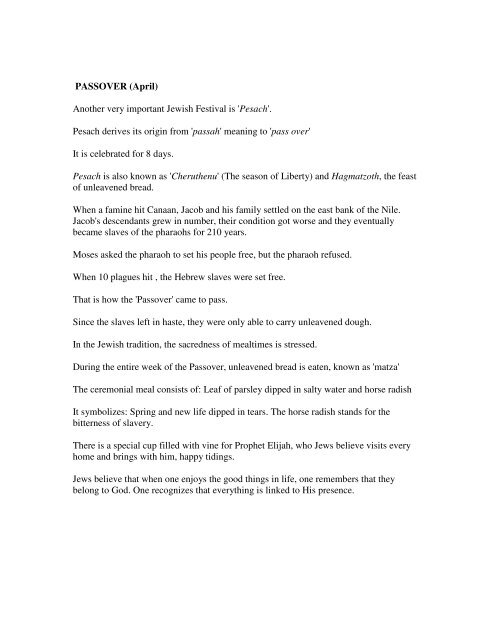Dadi-Nani Ki Kahaani Nani Ki Kahaani Nani Ki Kahaani
Dadi-Nani Ki Kahaani Nani Ki Kahaani Nani Ki Kahaani
Dadi-Nani Ki Kahaani Nani Ki Kahaani Nani Ki Kahaani
You also want an ePaper? Increase the reach of your titles
YUMPU automatically turns print PDFs into web optimized ePapers that Google loves.
PASSOVER (April)<br />
Another very important Jewish Festival is 'Pesach'.<br />
Pesach derives its origin from 'passah' meaning to 'pass over'<br />
It is celebrated for 8 days.<br />
Pesach is also known as 'Cheruthenu' (The season of Liberty) and Hagmatzoth, the feast<br />
of unleavened bread.<br />
When a famine hit Canaan, Jacob and his family settled on the east bank of the Nile.<br />
Jacob's descendants grew in number, their condition got worse and they eventually<br />
became slaves of the pharaohs for 210 years.<br />
Moses asked the pharaoh to set his people free, but the pharaoh refused.<br />
When 10 plagues hit , the Hebrew slaves were set free.<br />
That is how the 'Passover' came to pass.<br />
Since the slaves left in haste, they were only able to carry unleavened dough.<br />
In the Jewish tradition, the sacredness of mealtimes is stressed.<br />
During the entire week of the Passover, unleavened bread is eaten, known as 'matza'<br />
The ceremonial meal consists of: Leaf of parsley dipped in salty water and horse radish<br />
It symbolizes: Spring and new life dipped in tears. The horse radish stands for the<br />
bitterness of slavery.<br />
There is a special cup filled with vine for Prophet Elijah, who Jews believe visits every<br />
home and brings with him, happy tidings.<br />
Jews believe that when one enjoys the good things in life, one remembers that they<br />
belong to God. One recognizes that everything is linked to His presence.


